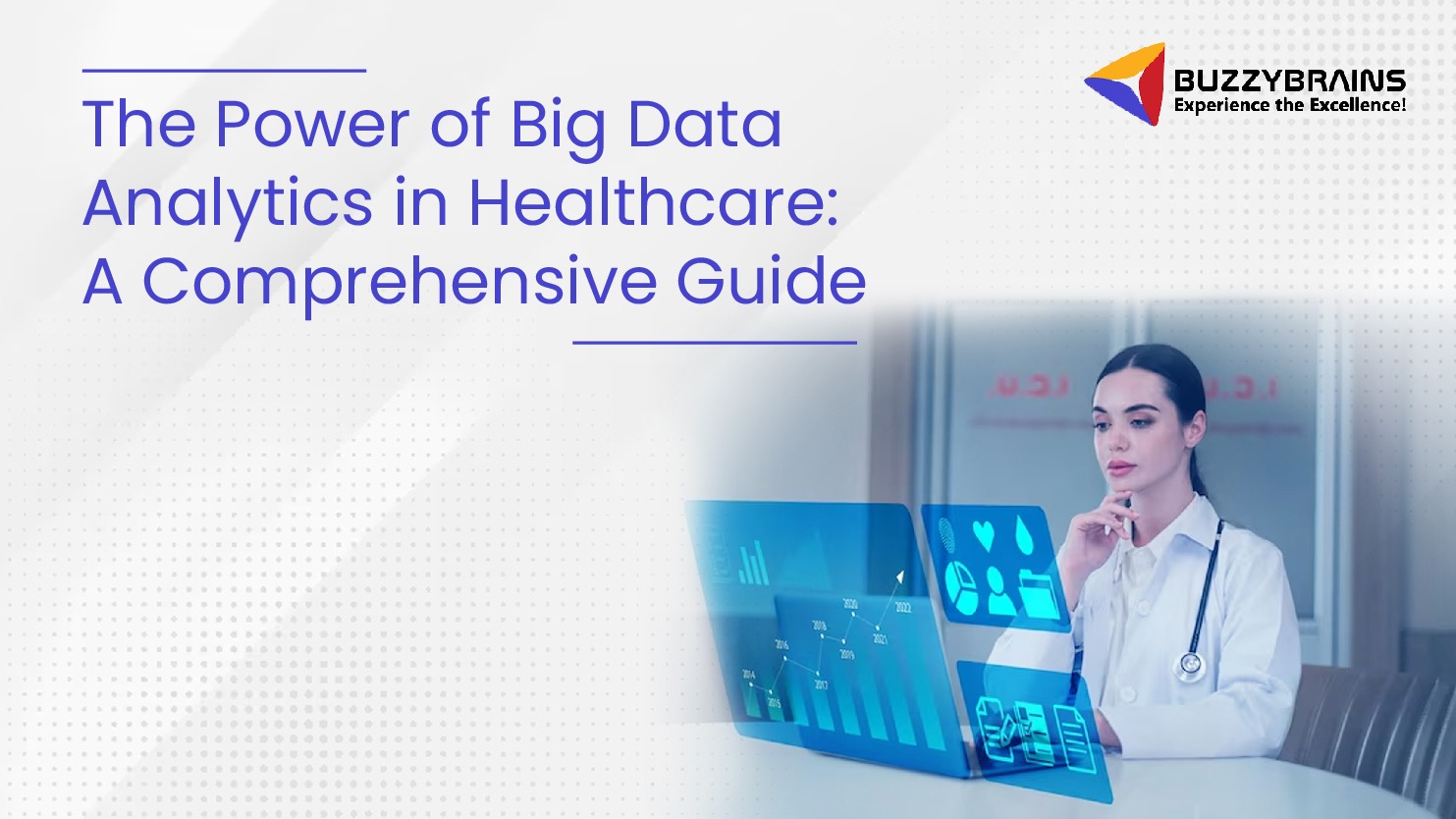The Power Big Data Analytics in Healthcare: A Comprehensive Guide

- What is Big Data Analytics?
- Big Data Analytics in Healthcare
- Benefits of Big Data Analytics in Healthcare
- Application of Big Data Analytics in Healthcare
- Role of Big Data Analytics in Healthcare
- What Are the Challenges in Implementing Big Data Analytics in Healthcare?
- Big Data Analytics Techniques & Tools Used in Healthcare
- Best Examples of Big Data Analytics in Healthcare
- What is the Future of Big Data Analytics in Healthcare?
- FAQs about Big Data Analytics in Healthcare
- Conclusion
- BuzzyBrains: Your Solution to Healthcare Data Analytics
What is Big Data Analytics?
In simple words, Big data analytics can be explained as the process of collecting, examining, and analyzing large amounts of data to uncover market trends, insights, and patterns – all of which can help organizations make better business decisions. The information required is readily and efficiently available so that companies can be swift and dexterous in their plans to maintain a competitive advantage.
Big data is characterized by five V’s – volume, velocity, variety, variability, and value. It is extremely complex and comprehensive. Thus, making sense of the data and its scale requires technology and analytics. Big data has potential and scope in diverse domains, such as governance, finance, healthcare, and more. When we talk about the big data and healthcare duo, the former can provide crucial insights into clinical data and thus foster informed decision-making regarding the diagnosis and treatment of patients, prevention of diseases, and more.
To begin with, big data analytics can improve the overall efficiency and robustness of healthcare organizations. The mechanism can, undoubtedly, contribute to profits and the cutting down of wasteful overheads for healthcare institutions, but there are larger and more impactful changes that can be envisaged. For instance, big data analytics within healthcare can be used to predict epidemics, cure diseases, improve the quality of life, and avoid preventable deaths.
Big Data Analytics in Healthcare
Benefits of Big Data Analytics in Healthcare
Within the healthcare sector, big data is generated by multiple sources and analyzed to guide decision-making, improve patient outcomes, and mitigate healthcare costs. Electronic health records (EHRs), personal health records (PHRs), and electronic medical records (EMRs) are the primary sources of big data in healthcare.
The five major benefits of analyzing big data within a healthcare context are –
- Improved Patient Care – More patient data means the scope and potential to better understand patient experience and enhance the overall care they receive.
- Smarter Treatments – The second major benefit of big data analytics in healthcare is improvement in treatment plans. By gauging and examining the treatments that helped patients and those that did not, it is possible to curate even better plants for future patients.
- Better Research – Big data provided medical researchers access to a near-infinite pool of data and methods of data collection. In return, the data can galvanize revolutions and breakthroughs within the medical field and save lives.
- Reduced Costs for Patients and Healthcare Providers – Last but not least, big data also makes it possible to reduce the cost of obtaining and providing healthcare by identifying the appropriate treatment plans, allocating resources wisely and meticulously, and preemptively identifying issues even before they occur.
Application of Big Data Analytics in Healthcare
Some of the pertinent applications of big data analytics in healthcare include –
- Staffing and Operations – By leveraging big data, healthcare professionals can anticipate patterns in patient admissions at specific times of the day, enabling them to efficiently schedule the appropriate amount of staff.
- Product Development – The second major application of big data in healthcare pertains to product development. Big data plays a crucial role in fostering innovation and accelerating the time it takes to introduce new products, such as prescription drugs, to the market.
- Crime Prevention – Big data in healthcare can facilitate the streamlining of insurance claims procedures, enabling providers to detect fraud more efficiently and expedite payment processing for patients.
- Strategic Planning – The fourth application of big data analytics in healthcare revolves around planning. Healthcare experts can compare chronic diseases and population growth in neighborhoods and identify problem areas and plan additional services.
Role of Big Data Analytics in Healthcare
Big Data plays a monumental role in shaping the future of healthcare. What are they? Let us find out!
- Overall Advancement in Healthcare Sectors – One of the biggest roles that big data analytics can play in healthcare is bolstering and improving the overall sector by facilitating science and technological advancements.
- Health Tracking – Big data coupled with the Internet of Things (IoT) are assisting in tracking the healthcare of a patient. Now, it is not only possible to track a patient’s sleep patterns, and lifestyle, but also their heart rate, blood pressure, and more.
- Additional Help to High-risk Patients – By offering high-risk patients with timely, meticulous, and customized care, big data analytics plays a major role in streamlining healthcare.
- Prevent Human Errors – Mistakes have no place within the healthcare domain. However, human errors are bound to happen. It is fairly common to hear some healthcare professional somewhere dosing the patient with the wrong medicines. The repercussions of such mistakes are incredibly costly. However, big data can help reduce the possibility of these mistakes by dissecting client information and endorsing the right prescription. In today’s day and age, when healthcare professionals are all overburdened, the feature can be of phenomenal help.
What Are the Challenges in Implementing Big Data Analytics in Healthcare?
Although big data analytics in healthcare is a revolutionary phenomenon, it is not free of challenges or hurdles. Some of the looming difficulties that big data in healthcare faces are –
- Struggle with Cohesion
As big data is a relatively novel entity within healthcare and is still evolving, it is difficult to keep pace with the ever-changing nature of the technology. Besides, with such vast amounts of data available to work with, organizations and leaders might also struggle with cohesion, knowing where and how to start, and finding the right meaning from the labyrinth of data. - Cyber Security Concern
The second challenge plaguing big data analytics in healthcare pertains to cyber security and information privacy. The question of governance – who owns and who is responsible for purveying the planning, implementation, and management of big data – is a looming question and concern among healthcare institutions. - Lack of Adequate Infrastructure
Thirdly, many healthcare organizations lack the appropriate and adequate systems and databases required to handle the colossal amounts of data. Thus, there is a gap in the availability of big data and the presence of the right infrastructure.
Big Data Analytics Techniques & Tools Used in Healthcare
There exists a plethora of sources from which healthcare institutions can get invaluable patient insights. Besides, nowadays, the focus has shifted from how ‘big’ the data is to how smartly and efficiently it can be managed. Some of the most impactful tools that healthcare institutions have for big data collection and analytics are –
- Patients portals
- Research studies
- EHRs
- Wearable devices
- Search engines
- Generic databases
- Government agencies
- Payer records
- Staffing schedules
- Patient waiting room
Best Examples of Big Data Analytics in Healthcare
Big data analytics has been the ‘tour de force’ of the contemporary healthcare terrain. We have multiple tangible examples that prove how succinctly big data has been for health and healthcare organizations.
- One of the most current and relevant examples of big data in healthcare is the global Coronavirus pandemic. It was big data that facilitated the rapid development of COVID-19 vaccines. Besides, big data analytics also helped predict the spread of the disease by allowing healthcare professionals to process all the available data in a timely fashion.
- The second example of big data analytics in healthcare pertains to preventing opioid abuse in the United States. Overused opioids have caused more accidental deaths in the United States than road accidents, and the problem is now seen as a national crisis. However, big data consisting of insurance and pharmacy statistics have enabled us to predict with a high degree of accuracy if someone is vulnerable to overdose and opium abuse; thereby, uprooting the problem from its origin.
What is the Future of Big Data Analytics in Healthcare?
The future scope and potential of big data analytics in healthcare are vast and expansive. Big data is anticipated to become widely recognized and integrated into all areas of the healthcare industry. Besides, it can also be expected to see many verticals adopting technology that supports greater analytical capabilities.
When we talk about numbers, studies reveal that the global big data in the healthcare market is predicted to touch the USD 34.27 billion threshold, and will grow at a CAGR of 22.07 percent during the forecast period. Thus, the possibilities of big data in healthcare are near-infinite, and exciting and path-breaking opportunities and trajectories await.
FAQs about Big Data Analytics in Healthcare
Q1. What kind of data is typically analyzed in healthcare using Big Data Analytics?
The most common type of data analyzed in healthcare big data is Electronic Health Records (EHRs), which contain a patient’s medical history, test results, immunization records, and more.
Q2. How does Big Data Analytics help healthcare providers make better decisions?
Big data analytics can help healthcare professionals make better decisions by identifying appropriate treatment plans, allocating resources wisely, and identifying health problems in a preemptive fashion.
Q3. What are some best practices for implementing Big Data Analytics in healthcare?
The best practices for implementing big data analytics in healthcare are –
- Using high-quality data
- Using bias-free AI
- Ensuring that healthcare providers trust and support the analytical tools
- Taking initiatives to improve patient safety
Q4. What types of skills and expertise are needed to work with Big Data Analytics in healthcare?
Some of the skills needed to work with big data analytics in healthcare are –
- Knowledge of mathematics and statistics
- Proficiency with data storage, data wrangling, data warehousing, and mining
- Familiarity with programming languages like Python, R, and SQL
- Experience with Microsoft Office, especially Excel
Q5. How can healthcare organizations get started with Big Data Analytics?
Ans. Healthcare organizations can get started with big data analytics by employing predictive analytics to create machine learning models.
Conclusion
So, there we have it, a crisp overview of big data analytics in healthcare. Big data is a behemoth and it has crucial significance within the domain of health and wellbeing. From facilitating preventative technologies to curative care, the scope of big data in healthcare is near-infinite.
BuzzyBrains: Your Solution to Healthcare Data Analytics
Are you ready to hop onto the healthcare data bandwagon? If yes, then look no further than BuzzyBrains. We specialized in data analytics services in healthcare and help create tools that streamline your institution’s operations. From concept to launch, our team delivers cutting-edge solutions that engage users and drive success. Discover the benefits firsthand – For more information, reach out to us today!
